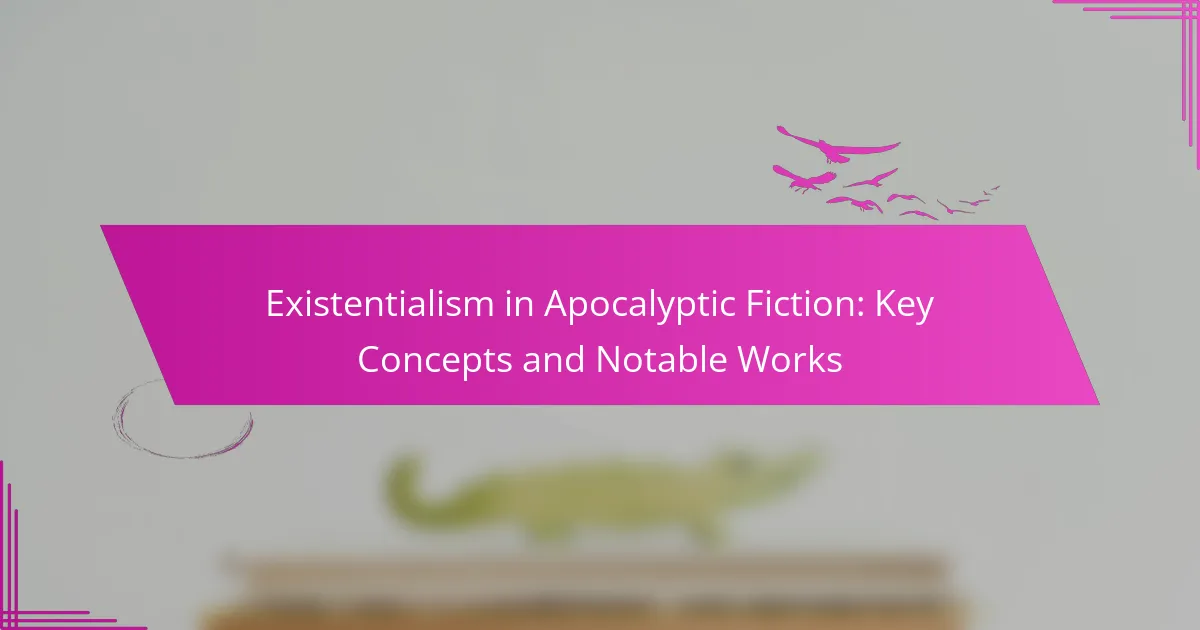Existentialism in apocalyptic fiction highlights the search for meaning in chaotic environments. Key concepts include absurdity, alienation, and authenticity. Notable works like “The Road” and “Station Eleven” illustrate these themes through characters facing moral dilemmas and isolation. Cultural contexts also shape the narratives, reflecting diverse perspectives on survival and purpose.

What are the core tenets of existentialism in literature?
Existentialism in literature emphasizes individual experience, freedom, and the search for meaning in a chaotic world. Key concepts include absurdity, alienation, and authenticity, often illustrated through characters facing existential dilemmas. Notable works in apocalyptic fiction that embody these tenets include “The Road” by Cormac McCarthy, which explores survival and moral choices in a desolate landscape, and “Station Eleven” by Emily St. John Mandel, highlighting the importance of art and human connection amidst societal collapse. These narratives reflect the struggle for meaning in a fragmented reality, showcasing the unique attributes of existential thought.
How does existentialism manifest in apocalyptic narratives?
Existentialism in apocalyptic narratives often highlights themes of absurdity, freedom, and isolation. These stories explore human existence when faced with catastrophic events, prompting characters to confront their purpose and choices. Notable works like “The Road” by Cormac McCarthy and “The Stand” by Stephen King illustrate these concepts vividly. They depict characters grappling with moral dilemmas, questioning the meaning of life in a desolate world. Such narratives emphasize the struggle for identity and meaning amid chaos, reinforcing existentialist philosophies.
Why is absurdism a key theme in existentialist apocalyptic fiction?
Absurdism is crucial in existentialist apocalyptic fiction because it highlights the inherent meaninglessness of existence amid chaos. This theme emphasizes characters’ struggles to find purpose in a world that seems indifferent to their plight. Notable works like “The Road” by Cormac McCarthy and “Waiting for Godot” by Samuel Beckett illustrate how absurdism manifests in dire circumstances. These narratives explore the tension between human desire for meaning and the harsh realities of an apocalyptic setting, reinforcing the existentialist perspective on life’s absurdity.

Which notable works exemplify existentialism in apocalyptic fiction?
Notable works that exemplify existentialism in apocalyptic fiction include “The Road” by Cormac McCarthy, “Station Eleven” by Emily St. John Mandel, and “The Book of the New Sun” by Gene Wolfe. These narratives explore themes of isolation, meaning, and human resilience in the face of societal collapse. “The Road” presents a stark journey of survival and the search for hope. “Station Eleven” examines the fragility of civilization and the persistence of art. “The Book of the New Sun” delves into identity and transformation amidst a dying world. Each work reflects unique aspects of existential thought within an apocalyptic framework.
How do classic works like “The Road” reflect existential themes?
Classic works like “The Road” reflect existential themes by exploring human survival, moral ambiguity, and the search for meaning in a desolate world. The characters confront profound isolation and the fragility of life, highlighting the human condition. Existentialism in apocalyptic fiction emphasizes choices, freedom, and the inherent absurdity of existence. “The Road” exemplifies this through its stark portrayal of a father-son relationship amid chaos, illustrating love as a source of hope. Such narratives compel readers to ponder their own existence and values in a world stripped of societal norms.
What role does “The Stranger” play in shaping existentialist thought in apocalyptic contexts?
“The Stranger” plays a pivotal role in shaping existentialist thought within apocalyptic contexts by illustrating the absurdity of existence. Through the character of Meursault, the narrative explores themes of alienation and the search for meaning in a world devoid of inherent purpose. This aligns with existentialist principles, emphasizing individual experience and the confrontation with an indifferent universe. The apocalyptic backdrop amplifies these themes, as characters grapple with existential dread amid societal collapse. The work invites readers to question the nature of existence and the human condition in extreme circumstances, reinforcing the core tenets of existentialism.

How do characters in apocalyptic fiction embody existentialist philosophies?
Characters in apocalyptic fiction often embody existentialist philosophies by confronting the absurdity of existence. They navigate a world stripped of societal norms, prompting deep introspection about purpose and meaning. This genre illustrates key existentialist concepts such as freedom, choice, and the inherent meaninglessness of life. Notable works like “The Road” by Cormac McCarthy and “Station Eleven” by Emily St. John Mandel exemplify these themes, showcasing characters who grapple with their identities and moral dilemmas in a desolate landscape. Through their struggles, these characters reflect the core tenets of existentialism, emphasizing individual agency amidst chaos.
What psychological struggles do protagonists face in these narratives?
Protagonists in apocalyptic fiction often face profound psychological struggles such as isolation, despair, and identity crises. These narratives explore the human condition under extreme circumstances, forcing characters to confront their existence and purpose.
Characters grapple with existential dread as they navigate a world stripped of societal norms. The collapse of civilization amplifies feelings of loneliness and hopelessness. As a result, protagonists frequently question their values and beliefs, leading to intense internal conflicts.
Survival becomes a central theme, highlighting the psychological toll of making morally ambiguous choices. Protagonists often experience guilt and trauma from their actions, which can lead to further psychological distress.
Ultimately, these narratives serve as a reflection of humanity’s resilience and vulnerability, showcasing the complex interplay between environment and mental health in extreme situations.
How do relationships evolve in existentialist apocalyptic settings?
Relationships in existentialist apocalyptic settings often shift towards deeper connections and existential questioning. Characters confront mortality, leading to intensified bonds and philosophical dialogues. Isolation can either fracture relationships or forge new alliances based on shared survival instincts. Notable works like “The Road” and “Station Eleven” illustrate these dynamics effectively.

In what ways do cultural contexts influence existentialist themes in apocalyptic fiction?
Cultural contexts significantly shape existentialist themes in apocalyptic fiction by framing human experiences and societal values. Different cultures emphasize unique existential questions, such as identity, purpose, and morality, which influence character motivations and narrative arcs. For instance, Eastern philosophies may highlight collective survival and interconnectedness, while Western narratives often focus on individualism and personal redemption.
Moreover, cultural responses to apocalypse reflect historical traumas and societal anxieties, such as war or environmental collapse. These elements create distinct existential dilemmas, illustrating how cultural backgrounds inform the interpretation of human existence in dire circumstances. Notable works like “The Road” by Cormac McCarthy and “Station Eleven” by Emily St. John Mandel exemplify these themes, showcasing varied cultural perspectives on survival and meaning in a post-apocalyptic world.
How do regional perspectives shape the portrayal of existential crises?
Regional perspectives significantly influence the portrayal of existential crises in apocalyptic fiction. Different cultures interpret existential themes through their unique historical, social, and philosophical lenses. For instance, Western narratives often emphasize individualism and personal struggle, while Eastern perspectives may focus on collective experiences and harmony with nature. This diversity shapes characters, plot developments, and underlying messages, reflecting varying responses to existential threats. Additionally, regional settings provide distinct backdrops that enrich the narrative, highlighting local beliefs and values surrounding mortality, survival, and the human condition.
What are the differences in existentialist themes between Western and non-Western apocalyptic fiction?
Western apocalyptic fiction often emphasizes individualism and existential despair, while non-Western narratives frequently highlight community resilience and interconnectedness. Western works like “The Road” by Cormac McCarthy focus on personal isolation and moral ambiguity. In contrast, non-Western stories, such as “The Last Children of Tokyo” by Yoko Ogawa, explore themes of collective survival and cultural continuity. This divergence reflects broader philosophical underpinnings, where Western existentialism questions the meaning of existence in solitude, whereas non-Western perspectives often seek meaning through relationships and shared experiences.

What unique attributes distinguish existentialist apocalyptic fiction from other genres?
Existentialist apocalyptic fiction uniquely emphasizes individual meaning and choice amid chaos. This genre explores themes of absurdity, isolation, and the search for purpose in a world facing destruction. Unlike traditional apocalyptic narratives, it delves deeper into psychological and philosophical dimensions, reflecting human existence’s fragility. Notable works, such as “The Road” by Cormac McCarthy, illustrate these concepts through stark landscapes and complex character introspection.
How do narrative structures enhance existential themes in these works?
Narrative structures enhance existential themes in apocalyptic fiction by emphasizing human isolation and the search for meaning. These structures often depict fragmented timelines and unreliable narrators, reflecting the chaos of existence. For instance, nonlinear storytelling can mirror the disorientation felt by characters facing existential crises. Such techniques deepen the exploration of identity and mortality, allowing readers to engage with the profound questions of existence in a world stripped of certainty.
What stylistic choices are prevalent in existentialist apocalyptic literature?
Existentialist apocalyptic literature often employs themes of absurdity, isolation, and the search for meaning. Characters frequently grapple with existential dread in a world stripped of societal norms. The narrative style tends to be introspective, focusing on internal conflicts rather than external action. Notable works, such as “The Road” by Cormac McCarthy, illustrate these stylistic choices through sparse prose and bleak settings, emphasizing the fragility of human existence and the quest for purpose amidst chaos.

Which rare attributes can be found in existentialist apocalyptic fiction?
Rare attributes in existentialist apocalyptic fiction include profound themes of isolation, the absurdity of existence, and the quest for meaning in a chaotic world. These works often feature unique character struggles against desolation and moral ambiguity, highlighting the fragility of human relationships. Notable examples include “The Road” by Cormac McCarthy, which explores existential despair through a father-son journey, and “Station Eleven” by Emily St. John Mandel, which reflects on the value of art and memory amidst societal collapse. The rare attribute of blending speculative elements with philosophical inquiry distinguishes this genre.
What unconventional narrative techniques are used by authors in this genre?
Authors in existentialist apocalyptic fiction often employ unconventional narrative techniques such as fragmented timelines, unreliable narrators, and stream-of-consciousness writing. These methods enhance themes of disorientation and the search for meaning in chaotic settings. For instance, fragmented timelines reflect the characters’ psychological states, while unreliable narrators challenge readers’ perceptions of reality. Stream-of-consciousness provides insight into characters’ inner turmoil, emphasizing existential dilemmas. These techniques collectively deepen the exploration of human existence amid societal collapse.
How do lesser-known works contribute to the existentialist discourse in apocalyptic fiction?
Lesser-known works significantly enrich existentialist discourse in apocalyptic fiction by exploring themes of isolation, identity, and the human condition. These narratives often present unique perspectives that challenge mainstream interpretations. For example, works like “Riddley Walker” by Russell Hoban delve into the fragmentation of language and meaning in a post-apocalyptic world, illustrating the struggle for understanding in chaos. Such texts frequently employ unconventional storytelling techniques, enhancing the exploration of existential themes. By focusing on personal experiences and philosophical dilemmas, these works contribute depth and variety to the broader conversation about existence in extreme circumstances.
What are the implications of existentialism on reader interpretation in apocalyptic fiction?
Existentialism profoundly influences reader interpretation in apocalyptic fiction by emphasizing themes of individual freedom, choice, and the search for meaning. This philosophical framework challenges readers to confront existential dread and the absurdity of life in a world facing collapse. Characters often grapple with their identities and moral dilemmas, prompting readers to reflect on their values and beliefs. Notable works like “The Road” by Cormac McCarthy illustrate these concepts, showcasing the struggle for meaning amidst chaos. Ultimately, existentialism in this genre fosters a deeper engagement with the text, encouraging introspection and personal interpretation.
What best practices should writers follow when incorporating existentialism in apocalyptic narratives?
Writers should focus on character depth, moral ambiguity, and the search for meaning when incorporating existentialism in apocalyptic narratives. These elements enhance the emotional impact and philosophical exploration of human existence under extreme circumstances. Emphasizing isolation, absurdity, and the struggle for authenticity can further enrich the narrative. Engaging with these themes allows for a profound examination of humanity’s resilience and the quest for purpose in a chaotic world.
